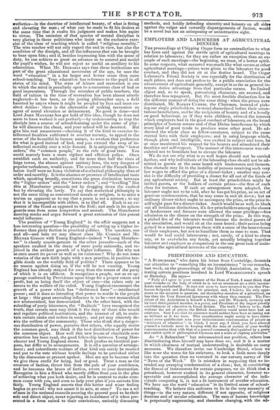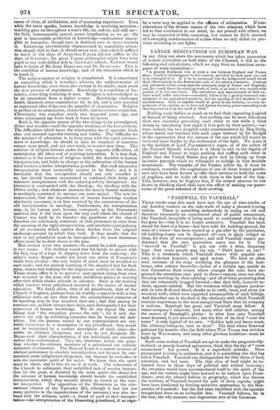PRIESTHOODS AND EDUCATION.
"A SUBSCRIBER," who dates his letter from Cambridge, demands our attention to " something like an inconsistency " in our remarks, last week, on the proceedings of the British Association, as illus- trating certain positions involved in Lord WHARNCLIFFE'S speech at Barnsley. He says- " Fully as I agree in your censure of the Dean of York, I must think that your remarks on the body of which he is not an ornament are a little inconsi- derate and uncharitable. It does not seem to have occurred to you that Pro- fessors Sedgwick and Buckland, his principal, and, I believe, his only oppo- nents on the occasion in question, are themselves members of a priesthood, no less than the Very Reverend Ignoramus with whom they contend. The Pre- sident of the Association is himself a Dean ; and Dr. Whewell, certainly not its least distinguished member, is a priest, and President of the largest priestly establishment of education in Great Britain. The truth I believe to be, that without the aid of priests the British Association would never have had an existence. Sure 1 am that its existence would neither have been so lasting nor so brilliant as it has been. This consideration ought surely to have intro- duced some qualification into your indiscriminate condemnation of priests as ministers of education' : in which, I must say, I think you have allowed yourself a latitude more in keeping with the tone of certain of your weekly contemporaries than with that of a journal commonly distinguished by a grave and candid spirit of philosophical tolerance and a scorn of claptrap platitudes."
As " A Subscriber " has misconceived our position, others less discriminating than himself may have done so; and it is a matter in which clearness of mutual understanding is desirable on many accounts. We therefore invite our Cambridge friend, whom we like none the worse for his strictures, to look a little more deeply into the question than we ventured in our cursory survey of the "News of the Week." He is mistaken in supposing that we in- tended any sweeping condemnation of a class ; but, in considering the fitness of instruments for certain purposes, we do think that a priesthood, however exalted in its general character, however re- spectable and accomplished the average character of the indi- viduals composing it, is not a fit instrument of secular education. We here use the word "education" in its limited sense of school- teaching. We believe this unfitness to lie in the very necessity of things—in the very nature, different if not opposite, of religious doctrine and of secular education. The sum of human knowledge is perpetually augmenting, and therefore changing, with the ads
vance of time, of civilization, and of unceasing experiment. Even while the tutor speaks, human knowledge is receiving accretion ;
teaching goes on throughout a man's life, on, ana on, and still on—
the field, immeasurably spread, seems lengthening as we go : the goal is inaccessible perfection of knowledge—omniscience impos- sible to humanity, though man is destined ever to move towards it. Knowledge preeminently characterized by mutability, educa- tion should shift as fast ; it should never rest : that which it sufficed
to teach in the days of AUGUSTUS CXSAR did not suffice in the days of GALILEO ; the great Tuscan philosopher might have been pupil to any well-drilled dolt in NEWTON'S school; NEWTON would have to learn of Sir JOHN IIERSCIIEL and Dr. BUCKLAND. Flux is the condition of human knowledge, and of the education which is to teach it.
The subject-matter of religion is sempiternal. It is enunciated as something which is revealed ; whereas the subject-matter of human knowledge, even when also eternal in its nature, must await the slow process of experiment. Knowledge is a condition of hu- manity, something centering in man. Religion is acknowledged to be an emanation from a higher source. Knowledge challenges doubt, demands cross-examination bit by bit, and is only received as registered after it has run the gauntlet of disputation. Religion is perfect on its enunciation, claims faith, and repudiates scepticism. Christianity was complete nearly two thousand years ago, and every subsequent age looks back to learn its lesson.
Such is the opposite nature of the two things to be promulgated, divine and secular—such the opposite tendency of the two missions. The difficulties which beset the missionaries are of opposite kinds also, and demand opposite training and habits. The difficulty for the minister of education is to keep pace with the rapid advance- ment of knowledge : he should at once be sceptical of assertion except upon proof, and yet ever ready to receive new ideas. The minister of religion labours under the very opposite difficulties, of maintaining old ideas and of resisting innovation. It is true that, eternal as is the essence of religious belief, the doctrine is human interpretation, and liable to change as the cultivation of the human mind renders a better interpretation possible. But each successive interpretation must necessarily assume to be final ; and it is inevitable that the interpreters should not only consider it so, but should become accustomed to confound their finite and transient interpretation with the enduring infinity interpreted : the hierarchy is confounded with the theology, the theology with the Divine entity ; and whatever menaces the merely human authority is mediately construed to menace one more sacred. The new in- terpretation, that the imperfection of human knowledge renders absolutely necessary, is at first received by the conservators of the old interpretation as sacrilege. Furthermore, the interpretation may, in its human part, become corrupted; as the Protestants asserted that it did even upon the very rock where the church of CHRIST was built by its founder: the guardians of the church therefore are solicitously conscious of that proneness to error from the meaning of the right interpretation, and entertain a just jealousy of all movement which carries them further from the original anchorage-ground by which they hold. It thus results that the view of any priesthood must be retrospective ; its most strenuous efforts must be to draw closer to the past.
Man cannot serve two masters—he cannot be a deft apprentice in two trades. The violinist would tear his hands to pieces with the fiery rasp of a rope in slipping down from the main-top ; the sailor's horny fingers would not know one string of PAGANINiS violin from another : the very habits of mind must be moulded to each craft ; and the patient watching of the shepherd lest his flock stray, makes bad training for the impetuous activity of the whaler. Those whose office it is to preserve man against erring from what was revealed in the past, will make indifferent guides in hunting after that which eludes pursuit in advance. Such is the training which renders every priesthood unsuited to the duties of secular education. We freely allow, that of all priesthoods, that of the Church of England, perhaps from its worldly connexion with a very utilitarian state, no less than from the accomplished character of its breeding, may be less unsuited than any ; and that among its numbers are, as there always have been, men distinguished for their promotion of human knowledge. We do not repeat the stale fallacy that " the exception proves the rule "; for it only dis- proves the rule by exhibiting examples that lie beyond the defi- nition. But the persons named by our correspondent are cer- tainly exceptions to a description of any priesthood : they would not be recognized by a correct description of their class—de- scribe an .ordinary clergyman, and you do not designate Dr. BUCKLAND: their characteristics, if not individual, are scientific rather than ecclesiastical. They are, therefore, beside the ques- tion whether the ordinary members of a priesthood are suitable ministers of education. The Dean of YORK is a cogent instance of clerical persistence in obsolete interpretation, not because he out- numbers more enlightened clergymen, but because he embodies in acts the inevitable spirit of his order. We know that the spirit must be there, and in him we see it at work. The reluctance of the Church to relinquish their unfulfilled task of secular instruc- tion for the poor, is dictated by the same spirit—the dread lest the advance of human knowledge should invade the established interpretation, which they account almost as sacred as the mat- ter interpreted. The opposition of the Dissenters to the edu- cational clauses of the Factories Bill, (though it had but too many pretexts in the imperfections of the measure,) was also im- bued with the selfsame spirit—a dread of peril to their interpre- tation—the interpretation of the Dissenting priesthood, if so regn-
lar a term may be applied to the officers of schismatics. If con- siderations of the diverse nature of the two missions, which have led to that conclusion in our mind, do not prevail with others, we may be suspected of false reasoning, but cannot be fairly accused of a sweeping condemnation of a class when we only define its pro- vince according to our lights.



























 Previous page
Previous page